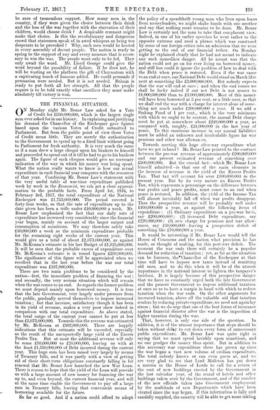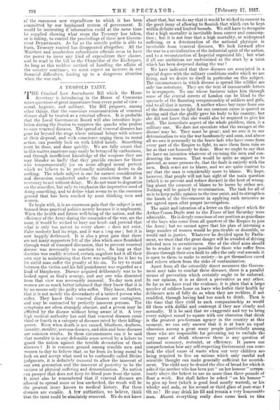THE FINANCIAL SITUATION.
ON Monday night Mr. Bonar Law asked for a Vote of Credit for £550,000,000, which is the largest single sum ever asked for in our history. In explaining and justifying his demand the Chancellor of the Exchequer gave figures based upon the various Votes of Credit submitted to Parliament. But from the public point of view these Votes of Credit mean little. They are merely the authorization to the Government to spend up to a fixed limit without going to Parliament for fresh authority. It is very much the same as if a man drew a large cheque upon his bankers to himself and proceeded to spend out of it till he had to go to his bankers again. The figure of such cheques would give no necessary indication of the way in which his money was being spent. What the nation really wants to -know is how our actual expenditure in each financial year compares with the resources of that year. Combining Mr. Bonar Law's statement with the very useful table of war-time expenditure published week by week in the Economist, we can get a close approxi- mation to the probable facts. From April 1st, 1916, to February 3rd, 1917, the total expenditure of the National Exchequer was £1,753,000,000. The period covered is forty-four weeks, so that the rate of expenditure up to the date given has been a trifle under £40,000,000 a week. Mr. Bonar Law emphasized the fact that our daily rate of expenditure has increased very considerably since the financial year began, mainly on account of the larger output and consumption of munitions. We may therefore safely take £40,000,000 a week as the minimum expenditure probable for the remaining eight weeks of the current year. This would give us a total of about £2,073,000,000, as against Mr. McKenna's estimate in his last Budget of £1,825,000,000. It will be seen that the probable excess of expenditure over Mr. McKenna's estimate is in round figures £250,000,000. The significance of this figure will be appreciated when we recollect that in the last year before the war our total expenditure was £197,000,000.
There are two main problems to be considered by the nation—first, the immediate problem of financing the war ; and secondly, the very serious situation which will remain when the war comes to an end. As regards the former problem we must depend mainly upon borrowed money. It is true that the late Government, very largely under pressure from the public, gradually nerved themselves to impose increased taxation ; but that increase, satisfactory though it has been in its yield of revenue, makes a very poor show indeed in comparison with our total expenditure. As above stated, the total outgo of the current year cannot be put at less than £2,073,000,000. Towards this the revenue was estimated by Mr. McKenna at £502,000,000. There are happily indications that this estimate will be exceeded, especially as the result of the unexpectedly large yield of the Excess Profits Tax. But at most the additional revenue will only be some £10,000,000 to £20,000,000, leaving us with at the least £1,550,000,000 of Debt incurred during the current year. This huge sum has been raised very largely by means of Treasury bills, and it was partly with a view of getting rid of these short-term obligations constantly falling in for renewal that Mr. Bonar Law launched the new War Loan. There is reason to hope that the yield of the Loan will provide us with a large amount of new money for financing the war up to, and even beyond, the current financial year, and will at the same time enable the Government to pay off a large sum in Treasury bills, leaving that convenient means of borrowing available for the future. So far so good. And if a nation could afford to adopt the policy of a spendthrift young man who lives upon loans from moneylenders, we might shake hands with one another and say that nothing more remains to be done. Mr. Bonar Law is certainly not the man to take that complacent view. Indeed, in one of his earlier speeches he went rather to the opposite extreme and used a phrase which was construed by some of our foreign critics into an admission that we were getting to the end of our financial tether. On Monday night he explained clearly that he had not meant to indicate any such immediwe danger. All he meant was that the nation could not go en for ever living on borrowed money, and still less could it ignore the problem of how to deal with the Debt when peace is restored. Even if the war came to an end at once, our National Debt would stand on March 31st next at something like £3,000,000,000. But nobody expects that the war will end at once ; and when the end comes we shall be lucky indeed if our net Debt is not nearer to £4,000,000,000 than to £3,000,000,000. Most of this money will have been borrowed at 5 per cent. or a little over, so that we shall end the war with a charge for interest alone of some- thing not much under £200,000,000 a year. If we add a Sinking Fund of 1 per cent., which is the very minimum with which we ought to be content, the annual Debt charge must be put at somewhere about £240,000,000 a year, as compared with, roughly, £24,000,000 in the last year of peace. To this enormous increase in our annual liabilities must be added an unknown and incalculable figure for war pensions and other war allowances.
Towards meeting this huge after-war expenditure what have we got in hand ? Mr. Bonar Law pointed to the contrast between the pre-war revenue of approximately £200,000,000 and our present estimated revenue of something over £500,000,000. But the crucial fact—which Mr: Bonar Law himself admitted—is that one of the main elements in the increase of revenue is the yield of the Excess Profits Tax. That tax will account for over £100,000,000 in the present year. But by its very nature an Excess Profits Tax, which represents a percentage on the difference between war profits and peace profits, must come to an end when peace is restored. In addition, the yield of the Income Tax will almost inevitably fall off when war profits disappear. Thus the prospective revenue will be probably well under £400,000,000 a year, as against the following items of expenditure : (1) Ordinary expenditure on a pre-war basis, say £200,000,000 ; (2) increased Debt expenditure, say £220,000,000 ; (3) new charge for pensions and war allow- ances, say £50,000,000—leaving a prospective deficit of something like £70,000,000 a year.
It would be interesting if Mr. Bonar Law would tell the House of Commons and the nation what provision he has made, or thought of making, for this post-war deficit. The moment the war ends there will certainly be a popular demand for reduction of taxation ; yet, as far as the situation can be foreseen, the• Chancellor of the Exchequer at that time will have to impose new taxes instead of remitting old ones, and to do this when it will be of the utmost importance in the national interest to lighten the taxpayer's burdens. It is largely because of this prospective danger that we have so constantly urged both the late Government and the present Government to impose additional taxation at once so as to have a margin in hand with which to reduce taxation when the war ends. On the other arguments for increased taxation, above all the valuable aid that taxation renders by reducing private expenditure, we need not again lay stress ; but we do urge that one of the best forms of insurance against financial disaster after the war is the imposition of higher taxation during the war.
That, however, is only one side of the question. In addition, it is of the utmost importance that steps should be taken without delay to cut down every form of unnecessary public expenditure. Mr. Bonar Law was quite right in saying that we must spend lavishly upon munitions, and no one grudges the money thus spent. But in addition to this necessary war expenditure there has grown up since the war began a vast new volume of civilian expenditure. The total nobody knows or can even guess at, and we are very glad to see that Lord Midleton has put down a motion in the House of Lords to call for a return of the cost of new buildings erected by the Government in the last calendar year, of the rental of hotels and other buildings taken over by the Government, and of the number of the new officials taken into Government employment by the multitude of new Departments which have been created since the war began. If this information is fully and candidly supplied, the country will be able to get some inkling of the enormous new expenditure to which it has been committed by our haphazard system of government. It would be interesting if information could at the same time be supplied showing what steps the Treasury has taken, or is taking, to control the proceedings of these new Govern- ment Departments. As far as the outside public is able to learn, Treasury control has disappeared altogether. All the Ministers and numberless subordinate officials seem to have the power to incur any kind of expenditure they choose, and to seud in the bill to the Chancellor of the Exchequer. As long as this reckless method of handling the affairs of the country continues, we must expect an increase in our financial difficulties, leading up to a dangerous situation when the war ends.



































 Previous page
Previous page